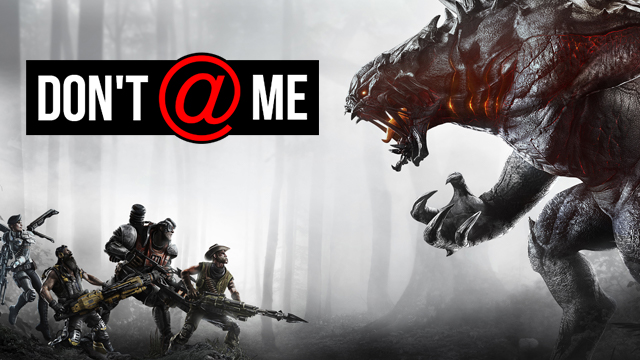Back in the halcyon days of 2015, 2K and Turtle Rock Studios released a game called Evolve. A first-person shooter filled with hero characters and cosmetic microtransactions, it was a dismal failure that got gamers up in arms. The next year, Blizzard released Overwatch, a first-person shooter filled with hero characters and cosmetic microtransactions. The crowds cheered with approval, and many games in the genre have followed in Blizzard’s footsteps. This is the story of how one game tanked while simultaneously predicting the next half-decade of popular mechanics in shooters. Sure, it may not have been the best playing game upon its release, but Evolve was inarguably ahead of its time.
New Age of Heroes
Right off the bat, let’s talk about the world of Evolve. Set in a space-faring future, Evolve doesn’t go for the typical militarized force. The heroes of Evolve are mercenaries, each with their own unique weapons and abilities. At the end of the game’s life, there were twenty unique characters, each with crisscrossing histories and relationships. Even at launch, Turtle Rock took what they learned from Left 4 Dead and applied it here, making the heroes feel like companions with a rich backstory. Considering the reaction to each new Overwatch character trailer, there is a hunger among fans for this level of worldbuilding. Looking back, Evolve did it better than anyone.
Another thing people also love about Overwatch is the unique things it brings to the shooter dance. You’ve got Hammond’s wrecking ball tank, Tracer’s teleports, and Sombra’s hacking skills. While all well and good, each character sticks to a very limited kit. You don’t want to be a healer all alone on the payload after all. You need to stick with teammates and play your well-defined class. It worked in Team Fortress 2 and still works in Overwatch, but it’s very limiting in the long run.
Other hero-based games have given their characters expanded options and shifted towards having a set gameplay style. In that way, abilities enhance gameplay rather than inhibiting player options. Before all this, Evolve was there first. Each hero has three weapons and a class ability, letting them fill plenty of different roles. While Bucket’s primary action as a support is to litter the battlefield with turrets, he also has a guided missile launcher so he can join in the hunt. Every character has a wealth of options and different styles, expanded further by the character alterations Turtle Rock rolled out later on. It truly felt like you could “main” an Evolve hero and not miss out on anything the game had to offer.
Dropping In Hot

Hero shooters aren’t at the top of the food chain anymore. The battle royale genre leads the way, with games like Fortnite and Apex Legends settings records everywhere. What’s the first thing you do in any battle royale match? Dive out of the dropship. What was one of the first big games to have you doing that? If you said Evolve, you’ve been paying attention. Not only do dropships play a pivotal role in setting up each Evolve hunt, but the game also uses it as a chance for more worldbuilding. The conversations shared between teammates before each drop do more to establish characters than anything in any other hero-based experience I’ve had.
Evolve also has you marching across a huge map with your team. This was unusual at the time, but much more common in the age of hundred player battles to the death. On a huge map such as this, you want a way to communicate with your team. Ideally, without listening to random teammates talk about how much they’re pwning noobs. Respawn recently introduced a highly advanced pinging system in Apex Legends. It lets you stay with your team while also staying silent on the mic. It’s a marvelous innovation, but Respawn didn’t create it out of thin air.
While it’s not nearly as advanced, Evolve also had a dedicated pinging button for spotting the monster and pointing out areas of interest. It was arguably more important here due to the nature of what you were doing in the main modes. Hiding as the monster was a legitimate strategy, so you’d need to track them down and mark clues so that your teammates could follow. In an age where most games were still pushing for singular glory, Evolve saw the shift towards team play coming. Like so many other things, they were just on the cusp of what was to come.
Going For The Kill
Despite knowing where the wind was blowing, Evolve couldn’t escape from the circumstances of its release. Its $60 price tag and microtransaction store repulsed a player base who weren’t used to monetization at that scale. Especially since there was no way to grind out skins and characters through cosmetic loot boxes. In addition, 2K’s eSports push for the title ignored its strengths, presenting an unrefined gameplay style to an audience all about polish and precision.
I’d love to see 2K try again with the franchise, but its failure was so spectacular that the name is probably tainted. Unless we see a game called Hunters of Shear pop up out of nowhere in the near future, Evolve will always have its place alongside Buckaroo Banzai and Police Squad in the hall of misunderstood media.











